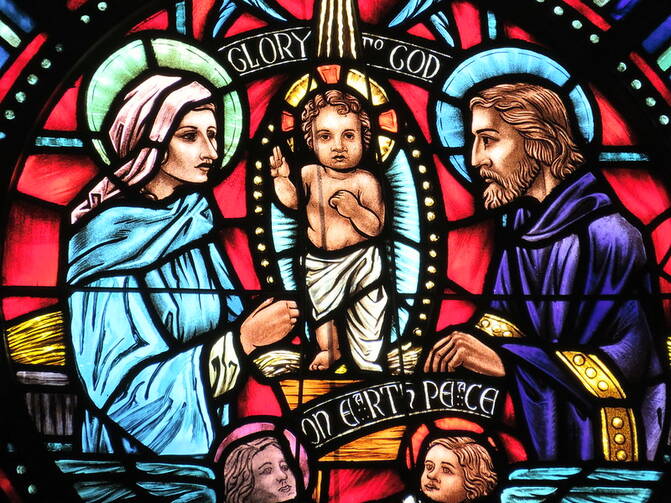The Presentation of the Lord reminds us of the importance of community
Today we celebrate Jesus’ presentation at the temple. This event is recorded only in the Gospel of Luke and is rooted in the Jewish practices of purification of a mother after childbirth and the offering of the firstborn son. While the event centers on Mary, Joseph and Jesus, two community members support the Holy Family during this celebration.
There was also a prophetess, Anna.... She gave thanks to God and spoke about the child. (Lk 2:36, 38)
How can I be a prophet in today’s society?
Do I recognize God in my life?
Do I invite people to praise and worship God?
The tradition described in Luke has its roots in Leviticus 12, which prescribes rules of purification and presentation. In ancient Judaism, after childbirth women were required to be purified before interacting with people and sacred objects. Giving birth to Jesus made Mary ceremonially unclean for 40 days (Lv 12:2-4). For the first seven days, she would avoid contact with people. For an additional 33 days, she would avoid contact with holy objects and the sanctuary. Though this may sound peculiar, it is important to remember that although childbirth was considered a divine blessing, purity regulations like these developed out of concerns and taboos regarding bodily fluids and their relation to religious activities.
At the end of the purification period, Mary and Joseph offered a sacrifice of two pigeons, which was expected from people who could not afford to offer a sheep (Lv 12:8).The parents also present Jesus at the temple, as was customary for all firstborn male children (Ex 13:2). The first and second readings complement this event, as Malachi prophesies about a messenger of the covenant at the temple, and the Letter to the Hebrews recognizes Jesus’ participation in Jewish rituals.
When Mary and Joseph present Jesus, they encounter two prophetic figures, Simeon and Anna, both of whom recognize the significance of Jesus. Filled with the Holy Spirit, Simeon had received a divine message that he would see the Messiah before his death. Recognizing the Messiah, Simeon takes Jesus into his arms and affirms that he can die having seen the Christ. Simeon asserts that Jesus is “a light for revelation to the Gentiles and glory for your people Israel” (Lk 2:32). Jesus is the Messiah for both Gentiles and Jews. Mary and Joseph are surprised that this relative stranger recognizes who Jesus is. Simeon blesses the parents and offers a message specifically to Mary that despite his importance, Jesus would be rejected by many.
We also hear about a woman prophet, Anna. Anna’s piety is highlighted, as she regularly worships, prays and fasts at the temple. Although there is no quoted speech from Anna, we are told that at the presentation she offers praise and thanksgiving to God and speaks about Jesus to all who were looking for redemption (Lk 2:38).
Although the Holy Family is central to this feast of the Presentation, Simeon and Anna play vital roles. Simeon publicly confirms Jesus’ identity and future ministry, and Anna shares Jesus with the world, proclaiming him to the Gentiles and Jews mentioned in Simeon’s prophecy. These community members affirm the significance of Jesus to the world.
This article also appeared in print, under the headline “The Importance of Community,” in the January 20, 2020, issue.









